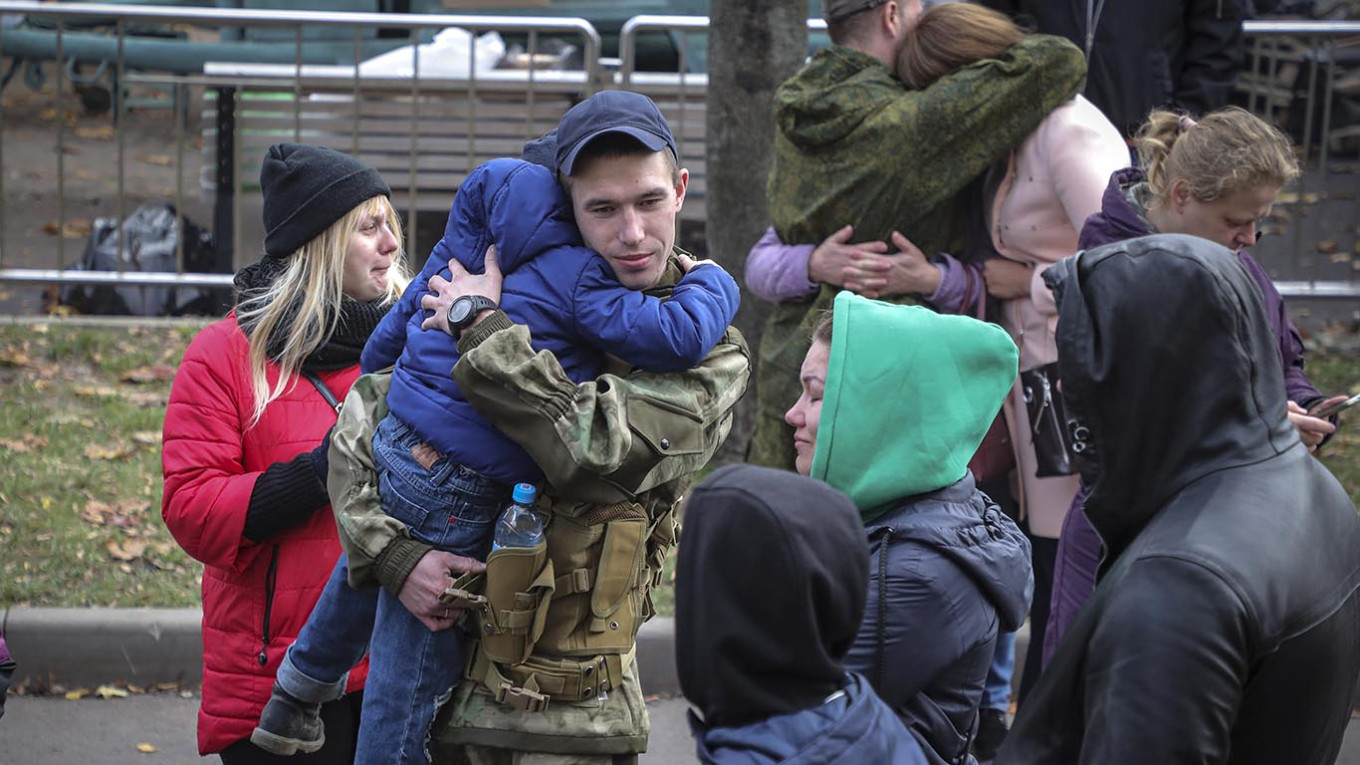As part of its initiative to combat orphanhood, Russia’s children’s rights advocate, Maria Lvova-Belova, has stated that she is paying “special attention” to families of soldiers involved in the conflict in Ukraine.
However, while official narratives suggest that the children of these soldiers are safe and well cared for, reports from regional ombudspersons present a different picture.
The accounts reviewed by The Moscow Times highlight families trapped in poverty, children moved between relatives and institutions, and widows struggling with bureaucratic processes that often deny them assistance when their husbands or fathers are killed or reported missing in action.
The Moscow Times has reached out for comments from Lvova-Belova’s office regarding these issues.
In the Sakhalin region, a single mother of two sought assistance after both of her previous partners vanished from her children’s lives. The father of her eldest child, who had previously been incarcerated, reportedly enlisted in the military directly from prison and was later declared missing in action. Meanwhile, the father of her younger child completely severed contact. With no alimony to rely on, the mother managed to get by on a state allowance of 12,000-23,000 rubles ($143-275) a month.
Similar situations are affecting widows or partners of soldiers who have gone missing, leaving them to fend for themselves.
In the Pskov region, a woman lost access to state benefits following the declaration of her soldier-husband as missing in Ukraine. Consequently, her family teetered on the brink of poverty, described by the ombudsman as a “difficult life situation.”
In the Tver region, northwest of Moscow, local children’s ombudspersons reported an increase in complaints from women seeking unpaid alimony from men who have gone to fight.
According to the law, minors without parental care are placed under the oversight of child welfare authorities. Larisa Loskutova, the children’s ombudswoman from Tomsk in Siberia, noted that parental involvement in the Ukraine conflict is a significant reason for delayed placements of children in state-run orphanages.
Dozens of families of soldiers in the Altai region have now been officially recognized by municipal juvenile affairs commissions, highlighting the crisis that military service has created for many families, according to the local children’s ombudsman.
Russian orphanages have a notorious reputation for their poor living conditions, where children often have to share everything except underwear, and reports of physical, psychological, and sexual abuse continue to emerge. While some offenders face prosecution, many evade punishment entirely. In St. Petersburg, a man accused of child abuse was able to escape prison by enlisting in the military and being deployed to fight in Ukraine.
Many orphans, upon leaving these institutions at the age of 18, are ill-equipped for adult life, lacking the skills to manage everyday tasks like paying bills or doing laundry, and often leaving with very few personal belongings.
In the Vladimir region, custody of a boy was transferred from his grandmother, who had cared for him since his mother lost parental rights in 2018, to his father, a soldier who had been largely absent. The father, having enlisted directly from prison to fight in Ukraine, was granted full custody upon his return in 2023 despite not having been involved in the child’s life before. He has since returned to combat.
“This case illustrates that ‘veteran privileges’ extend to an almost unconditional claim on children,” historian Dmitry Dubrovsky told The Moscow Times. “A ‘veteran’ can demand almost anything and typically receives it, even when it contradicts the child’s best interests. In reality, Russia does very little to safeguard those interests.”
“Under the guise of ‘traditional values,’ children are treated as ‘property’ belonging primarily to their fathers and mothers,” he further explained. “Thus, this ‘property’ is simply returned to its ‘owner,’ with little genuine concern for the child’s future.”
In the Jewish autonomous region, the local children’s ombudsperson shared the story of a soldier’s mother raising a child alone in a deteriorating former dormitory. The building’s shared plumbing was broken, and an upstairs neighbor, who was a heavy drinker, caused daily disruptions. After police and building management failed to aid her, she turned to the ombudsman for assistance.
“An authoritarian regime does not equate to effective governance,” added Dubrovsky. “Ineffectiveness, or simply chaos, also defines ideological campaigns that glorify so-called ‘heroic warriors.’”
Researchers in Russia have conducted studies on the psychological challenges faced by the families of soldiers. Beyond the stress and anxiety that children endure, psychologists also highlight families’ fears regarding their fathers or husbands returning from war suffering from PTSD — “concerns about potential mental health changes and the repercussions upon returning home.”
In some instances, children’s ombudspersons have made efforts to repatriate soldiers from the front to care for their families. Formal complaints have emerged in at least three regions requesting soldiers be brought back from the front line, as calculated by The Moscow Times.
In Mordovia, one complaint involved a boy whose mother passed away while his father was serving in Ukraine. To resolve the custody issue, the ombudsman contacted military prosecutors and the Defense Ministry. Ultimately, the father was discharged from service and is now raising the boy alone.
In the Volgograd region, a mother reached out to the local ombudsman to bring her son back from the battlefield. The soldier had been fighting since 2022, and the child’s mother had died after the invasion started. He submitted a resignation request but received no response. At the time of filing the complaint, both he and his child were still stationed at the front near Tokmak in Ukraine’s Zaporizhzhia region, according to the local ombudsman.
A similar case emerged in the Chuvashia republic, where a soldier with two disabled children sought to leave the military following his wife’s death in 2024, yet other relatives were unable to step in. His request remains unaddressed.
Sometimes, children are cared for by older relatives, some of whom are already beginning to steer them towards military careers as the conflict persists.
“One grandmother called me asking for help with her grandson’s documents for military school since his father is deployed and his mother has passed away,” recalled the children’s rights commissioner from the Jewish autonomous region. The elderly woman, from Yekaterino-Nikolskoye, requested assistance in preparing her grandson’s application to a military academy.
The boy is now expected to enroll in the Ussuriysk Suvorov Military School, a pathway for future military officers.

